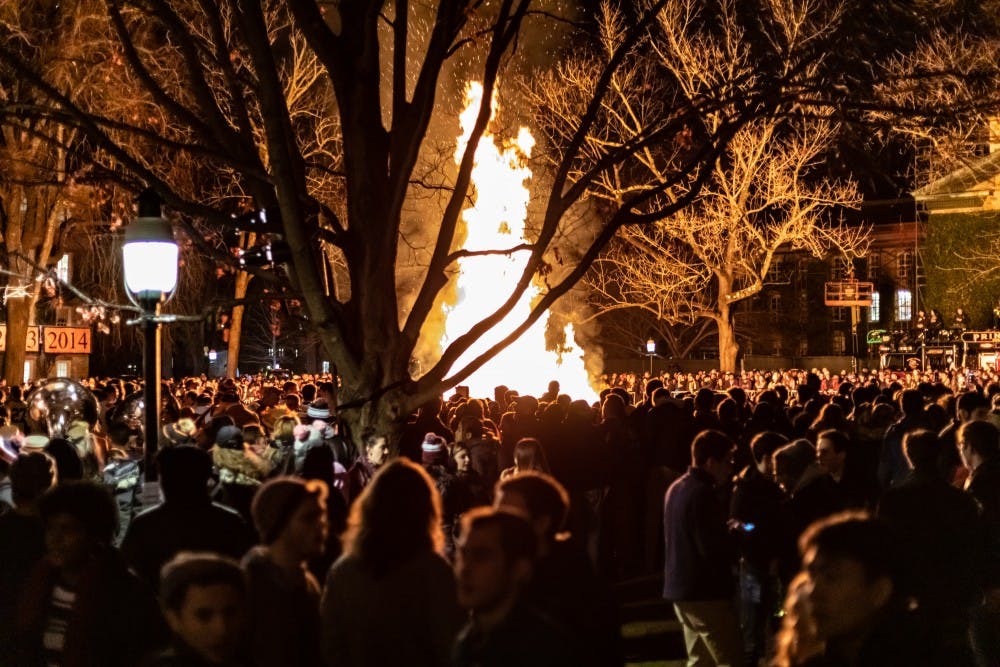The tradition of holding a bonfire to celebrate our victory over Harvard and Yale in football is a beautiful custom rooted in our University experience and common experiences at most colleges in the United States. I say our victory over Harvard and Yale because football games — the game itself, the excitement, and the spirit surrounding it — bring students, faculty, administrators, and alumni together. We all get to share in the football team’s most public display of their talent and discipline. Avner Goldstein’s opinion piece lobs wrongheaded ideological attacks against this much-loved celebration and recklessly smears the football players in the process.
Look around at schools across the country of all sizes and missions, and you will see that almost without exception, football is a public social experience that brings the entire community together around a common cause, an important feature of a school’s character in a way that no other sport is. That’s why we began celebrating this victory against our rivals so ostentatiously, and that’s why we still do. We should continue to celebrate it in exactly that unique way.
We don’t uphold traditions blindly just because they’ve been around for a long time. We continue them because we understand that traditions often remain for good reasons — reasons that we still accept today as we join a long line of observance that extends back decades or longer. We respect the enduring goodness in them. To judge every custom passed down to us by some hyperrationality is the arrogance of the present, and to judge them by radical ideological standards is often even more dangerous, as it is here.
Certainly, the past is rife with examples of evil, contemptible practices that we can and should end immediately where they persist. Goldstein claims that “for our campus community, the only item worthy of deeply rooted tradition seems to be a celebration of men in a sport that not only excludes women but historically has celebrated whiteness and continues to entertain racism.” But nobody actually looks at this celebration of two big wins for the football team that way. On its face, the argument that the bonfire is the product of oppressive masculinity is wrong. No other team, whether men’s or women’s, receives this kind of special ceremony. The other men’s teams are just as excluded as the women’s teams are. The motivation, then, is not animus for women or their athletic programs.
The more compelling contention is that other teams deserve more equitable public recognition for their impressive performances. When I’m at DeNunzio Pool or Dillon Gymnasium, I’m proud of our athletes’ achievements hanging from banners on the walls that represent our long history of athletic excellence. It is rightly a point of great pride.
That’s why I support efforts to celebrate the outstanding athletes at the University, of which we have many. In fact, I hear and share many wishes that the students at this University would pay more attention to the athletic community and that more publicity and appreciation for them, their hard work, their competitions, and their victories would be afforded them. Yet, despite this, the bonfire should remain unique to this particular football tradition, and most students would welcome, as I would, many more new traditions to commemorate any and all of the other teams’ successes, rather than eroding this one. I don’t think Goldstein would oppose new commemorative traditions, but I disagree with him that the bonfire should be open to other teams.
The claim that football is an inherently racist sport seems to me the most absurd claim. People of all races play, coach, watch, and love football. According to the NCAA, last year over 47 percent of Division I FCS players were black with less than 40 percent white in the same category. Over 20 percent of head coaches in the same category were black. I will not delve into the claims concerning the consequences some professional athletes have faced for their public political beliefs on matters of race relations in the United States, but even if the worst possible interpretations of their censures are true, that proves nothing about the racist nature of the sport itself, if that’s even possible. If anything, the football team is one of the most inclusive, most diverse institutions we have at the University.
This criticism lodged against the bonfire asserts not only that football is racist and misogynist, but also that the men on the Princeton team are agents of such an incorrigible system. This is horrible and untrue, and it attacks the entire team’s character for doing nothing more than being deservedly celebrated for their achievements.
Keep the bonfire for football. Celebrate all the athletes in your clubs, classes, and dorms. Make new traditions, share them, and keep them. And when we find things that bring us all together for wholly good reasons as the bonfire does, cherish them, because they don’t come around very often.
Will Crawford is a junior history concentrator from Rome, Ga. He can be reached at wwc@princeton.edu.










